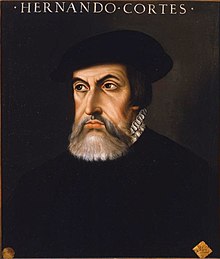Hernán Cortés
| Hernán Cortés | |
|---|---|

Hernando Cortés
|
|
| 1st Governor of New Spain | |
|
In office 13 August 1521 – 24 December 1521 |
|
| Succeeded by | Cristóbal de Tapia |
| 3rd Governor of New Spain | |
|
In office 30 December 1521 – 12 October 1524 |
|
| Preceded by | Cristóbal de Tapia |
| Succeeded by | Alonso de Estrada, Rodrigo de Albornoz, Alonso de Zuazo (triumvirate) |
| Personal details | |
| Born |
Hernando Cortés de Monroy y Pizarro Altamirano 1485 Medellín (Extremadura), Castile |
| Died | December 2, 1547 (aged 61-62) Castilleja de la Cuesta, Castile |
| Nationality | Castilian |
| Children | Don Martín Cortés, 2nd Marquis of the Valley of Oaxaca Doña Maria Cortés Doña Catalina Cortés Doña Juana Cortės Martín Cortés (son of doña Marina) Leonor Cortés Moctezuma |
| Occupation | Conquistador |
| Known for | Spanish conquest of the Aztec Empire |
| Signature | |
Hernán Cortés de Monroy y Pizarro Altamirano, Marquis of the Valley of Oaxaca (Spanish pronunciation: [erˈnaŋ korˈtes ðe monˈroj i piˈθaro]; 1485 – December 2, 1547) was a Spanish Conquistador who led an expedition that caused the fall of the Aztec Empire and brought large portions of mainland Mexico under the rule of the King of Castile in the early 16th century. Cortés was part of the generation of Spanish colonizers who began the first phase of the Spanish colonization of the Americas.
Born in Medellín, Spain, to a family of lesser nobility, Cortés chose to pursue a livelihood in the New World. He went to Hispaniola and later to Cuba, where he received an encomienda and, for a short time, became alcalde (magistrate) of the second Spanish town founded on the island. In 1519, he was elected captain of the third expedition to the mainland, an expedition which he partly funded. His enmity with the Governor of Cuba, Diego Velázquez de Cuéllar, resulted in the recall of the expedition at the last moment, an order which Cortés ignored.
Arriving on the continent, Cortés executed a successful strategy of allying with some indigenous people against others. He also used a native woman, Doña Marina, as an interpreter; she would later bear Cortés a son. When the Governor of Cuba sent emissaries to arrest Cortés, he fought them and won, using the extra troops as reinforcements. Cortés wrote letters directly to the king asking to be acknowledged for his successes instead of punished for mutiny. After he overthrew the Aztec Empire, Cortés was awarded the title of Marqués del Valle de Oaxaca, while the more prestigious title of Viceroy was given to a high-ranking nobleman, Antonio de Mendoza. In 1541 Cortés returned to Spain, where he died peacefully but embittered, six years later.
...
Wikipedia
